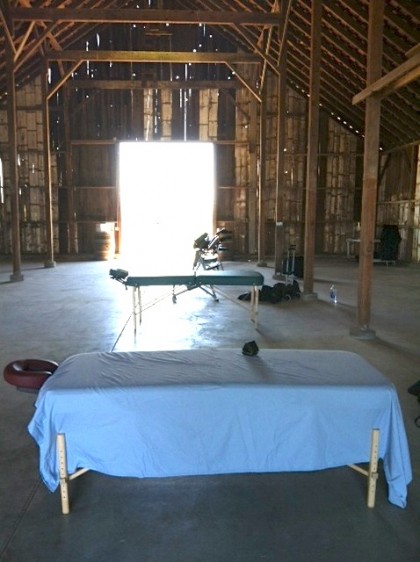Body Mechanics | At the Intersection of Massage School and Local Organic Produce

One aspect of a healthy lifestyle is having a healthy diet. And an aspect of the “healthy diet” that has gotten a lot of exposure in recent years is the need to eat locally grown food produced without chemical fertilizers and pesticides.
Local, sustainably produced food has tons of health and environmental reasons to recommend it, and it generally tastes great too. But it does take work. Now, conventional, chemical-intensive agriculture is not easy either, but the work is generally reduced by using huge, expensive, gas-guzzling machinery and expensive, frequently toxic chemicals.
With seasonal, chemical-free farming, that chemistry and machinery is replaced by the farmer’s energy and exertion: digging, hoeing, weeding, shoveling, hauling, picking, and so on. In other words, many of the health and environmental benefits of small-scale, sustainable farming are due to the fact that the process rests on natural cycles… and lots of manual labor.

When I was in massage school up in the mountains of North Carolina, I spent some time working on an organic farm. The work was fun, active, outdoors, and I often came home with a bag of fresh veggies too. Wielding shovel and hoe, I did battle with weeds and insects. Naturally, I deeply appreciated my newfound circle of massage therapists-in-training. But what really surprised me was the difference that was made by learning to move efficiently… in other words, using good body mechanics. If you aren’t familiar with the term, check out this great video introduction to Proper Body Mechanics For Massage Therapists.
When I brought my massage therapist’s Lunge and Weight Transfer out to the spinach field it was nothing short of a revelation.
Suddenly it seemed like I had a boundless reserve of energy to apply to all of manual-labor challenges that farm work provides. The actual work became more fun, and the attention to the body mechanics made me more present with my work, and in a paradoxical way, being present rather than daydreaming made the work shift fly by. And at the end of the day I wasn’t exhausted, but energized, like I had done several hours of Tai Chi – the only difference being I had a hoe or shovel in my hand the whole time!
Now fast forward some fifteen years… My path of teaching massage has led me to Sonoma County, which may as well be the center of the sustainable farming universe. A multitude of small, sustainable farms are scattered across the wine country. Many are certified organic, and at least a few describe their practices as “beyond organic”.
As an effort to give something back to the hard-working men and women who are fighting on the front lines of this Food Revolution, National Holistic Institute’s Petaluma Campus is sending Student Therapists out to local small farms to do massage and offer coaching on body mechanics and self-care. This is a chance for sore, tired bodies to get massage, as well as get the movement education that might help them be a little less sore and tired next time. It’s also a chance for the students to practice their massage, networking, and health educator skills… and maybe to come away with some nice fresh veggies too!

Do you want to get involved in supporting our sustainable farmers?
Here are some ideas that you could easily implement in your area:
• Farmer’s Markets have become a big hit in many urban areas. This is a great opportunity to meet and market to healthy-minded people in general, and many markets feature on-site massage for customers. Bring your business cards!
• Farmer’s Markets are a prime way to meet your local farmers. Most of these folks would be happy to have you tour their farms. With a little clever marketing, you could easily set up a chance to do free chair massage for their workers as a promotional activity. You could also make a pitch to offer a little mini-class on body mechanics and self-care. Bring your fliers and Powerful Presentation skills!
• Most farms have a farm store on-site that could make a good externship site. Many organic farms have volunteer, internship, and work-trade options – and some might even be open to trading massage for farm produce. “Will work for food! (if it’s sustainable, local, and organic!)”
I hope that inspires you to “lend a hand” to the sustainable farming movement! Happy Eating!
~William Mathis,
Mentor and Instructor
NHI Petaluma